As COVID-19 hit its full effect in early 2020, the U.S. was faced with an unprecedented worldwide pandemic. Due to the pandemic, many nations — including the United States — chose to quarantine, changing the lifestyles of their respective populations. Of the many who were affected by the changes, students were one of the most impacted demographics.
A vast majority of high schools in the U.S. have adapted to quarantine by implementing methods of virtual education. However, the drastic differences between virtual and in-person education have also prompted drastic outcomes—both mentally and academically. As students are returning to school this fall, the after effects of virtual education are a concerning topic for them to think about.
To discover the most common after effects of Zoom school, VOX Media Café conducted a survey of nearly 30 high-school students from Georgia and California.
One of the most significant effects of virtual learning was the mental impact it had on students.
From Georgia, sophomore Genesis Strother stated, “My teachers made a great effort to engage and connect with each student.”
However, freshman Ashton Tyler remarked, “Not having a teacher from time to time to physically help me made everything super stressful.”
Overall, many Georgia students felt that their learning was impacted “in negative ways,” as worded by junior Francesca Henderson.
According to an article by The Atlanta Journal-Constitution, the mental toll virtual learning has taken on Georgia students has prompted Atlanta Public Schools (APS) to increase their mental-health counseling staff. With the increase in mental-health and counseling staff, APS will have enough staff to place one mental health provider in every APS school.
In California, students were overall more thankful for virtual education. “In-person [school] would have been much harder,” stated Srikar Nimmagadda, a high-school junior from California. “Especially with the schedule change. The amount of homework a day was a lot lower online.” The 20 surveyed California high school students generally stated that virtual learning was more lenient and less stressful compared to a potential in-person learning experience.
A similarity both Georgia and California students noticed after assessing their mental states was their decrease in participation. Due to virtual education’s passive learning format (cameras turned-off, microphones turned-off), students found themselves bored, and at times, distracted. With this, many of the surveyed students realized they needed to have great “self control” and “self motivation.”
Many in-person activities, such as science labs, or even school events, were cancelled as well. Due to the limitations virtual learning placed on participation, students often found themselves in an isolated environment.
In addition to the mental impact virtual learning had on education, a large concern for many audiences was the academic impact virtual learning had on students.
In Georgia, there was a mixed response regarding academic performances. Some said they performed “horribly” due to the virtual format, while others stated their performance remained about the same as it would have been if education had been in-person. No matter what their performance was like, however, many ultimately believe a year of virtual education weakened their study skills and that they were not as productive as they could have been.
Fremont Union High School District of California noticed different trends. Junior Theodore Lai, stated, “It didn’t feel like it affected my learning material.” Similarly, Yixuan Wong added, “I performed the same [academically] as I would in person.” California high school students were generally indifferent to the effects virtual education had on their academic learning. All students believed they would have performed and learned the same, whether they had learned virtually or in-person.
Though there were some subtle differences in the academic outcomes for Georgia and California, a national consensus was conducted in the beginning and the end of the 2020-2021 school year. In July 2020, about 48% of the parents of students in grades K-12 believed that their students would fall behind if they continued with online education. However, when asked the same question in February of 2021, the percentage of parents distrusting virtual education’s effectiveness increased to about 61%.
Luckily, both Georgia and California plan to return to in-person school for the 2021-2022 school year. Though there are no guarantees that the transition from virtual education to in-person will be a smooth one, many look forward to returning to the learning experience they are familiar with.
VOX Media Cafe reporter Derek Liu, 16, attends Lynbrook High School in California.




